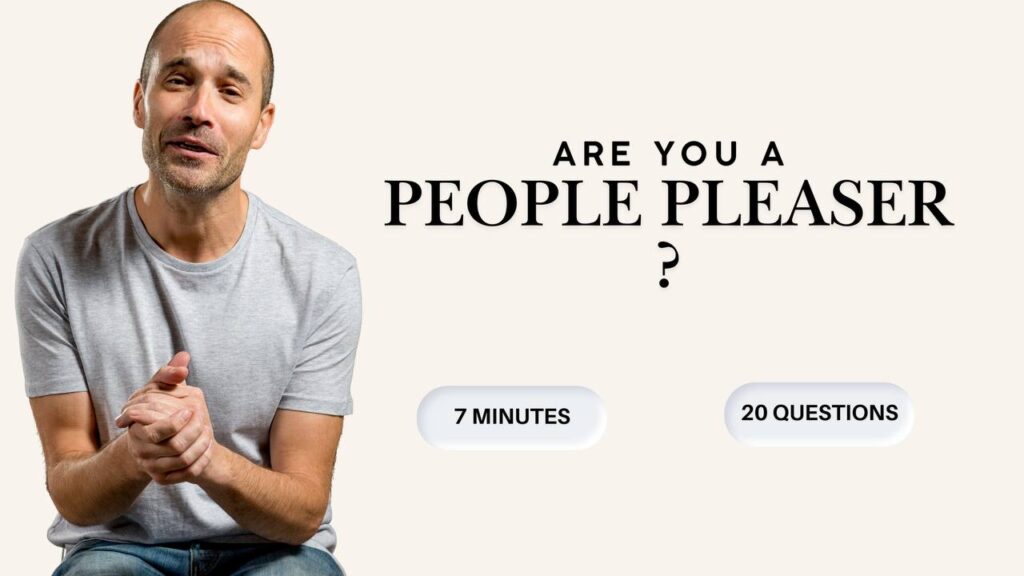
Results
Highly People-Oriented
- What This Means: Your responses suggest strong tendencies toward people-pleasing, often prioritizing others’ needs over your own.
- Insights:
- Frequently say “yes” to requests, even at personal cost.
- Highly empathetic and driven by a desire to be liked and appreciated.
- May struggle with setting boundaries or expressing your own needs.
- Next Steps:
- Practice saying “no” to requests that compromise your well-being.
- Reflect on the motivations behind your actions—are they rooted in genuine care or fear of disapproval?
- Explore self-care practices to replenish your energy and focus on your own priorities.
Moderate People-Pleaser
- What This Means: Your responses indicate a tendency toward people-pleasing, though it may not dominate your interactions.
- Insights:
- Often empathetic and willing to help others, but can recognize when it’s too much.
- Occasionally compromise your own needs to maintain harmony.
- Likely to value approval but able to balance it with self-respect.
- Next Steps:
- Work on identifying situations where people-pleasing might be limiting your growth.
- Build confidence in asserting your needs and opinions, even if it causes discomfort.
- Strengthen your decision-making by prioritizing what aligns with your values.
Balanced Approach
- What This Means: Your responses suggest a balanced approach to people-pleasing, with the ability to support others while respecting your own boundaries.
- Insights:
- Generally empathetic but not overly accommodating.
- Comfortable balancing personal needs with the needs of others.
- Likely to maintain healthy boundaries in most situations.
- Next Steps:
- Continue nurturing this balance by being mindful of your limits.
- Reflect on how your actions align with your long-term goals and relationships.
- Encourage others to adopt a similar balanced approach in their interactions.
Assertive Individual
- What This Means: Your responses suggest minimal tendencies toward people-pleasing, indicating strong assertiveness and self-confidence.
- Insights:
- Unafraid to set boundaries and prioritize your own needs.
- Likely to focus on authenticity over seeking approval.
- Occasionally perceived as distant or self-focused by others.
- Next Steps:
- Ensure that assertiveness doesn’t come at the expense of empathy.
- Reflect on how your interactions impact relationships and mutual trust.
- Look for opportunities to support others without compromising your values.
Highly Independent
- What This Means: Your responses indicate strong independence with little to no people-pleasing tendencies.
- Insights:
- Focused on personal goals and values, with little concern for external approval.
- Strongly self-reliant and confident in your decisions.
- May unintentionally overlook others’ needs or perspectives.
- Next Steps:
- Cultivate empathy to enhance connections and relationships.
- Reflect on how your independence influences teamwork and collaboration.
- Explore ways to balance your autonomy with meaningful support for others.
#1. I need to meet other people’s expectations.
#2. I agree with others just to keep the peace.
#3. I am afraid to say no to people.
#4. I rarely share my opinions because I don’t want to upset anyone.
#5. I’m not afraid to make decisions that might make others unhappy.
#6. I put the needs of others before my own.
#7. Even if something isn’t my fault, I apologize anyway
#8. I feel responsible for the happiness of the people in my life.
#9. I want to get the approval of others.
#10. I tend to go with the flow, even if it makes me feel uneasy.
#11. I try to avoid anyone’s disapproval.
#12. Standing up for myself can be hard.
#13. I need the validation of others.
#14. I make compromises so that other people are happy.
#15. I rarely hide how I feel, even if it might be unpopular.
#16. I help other people, even when they do not ask for it.
#17. I feel terrible when another person is unhappy with a decision I’ve made.
#18. I rarely disagree with others; I’d rather be liked.
#19. I often seek reassurance from others.
#20. I rarely take on responsibilities that are not mine.
Previous
Finish


